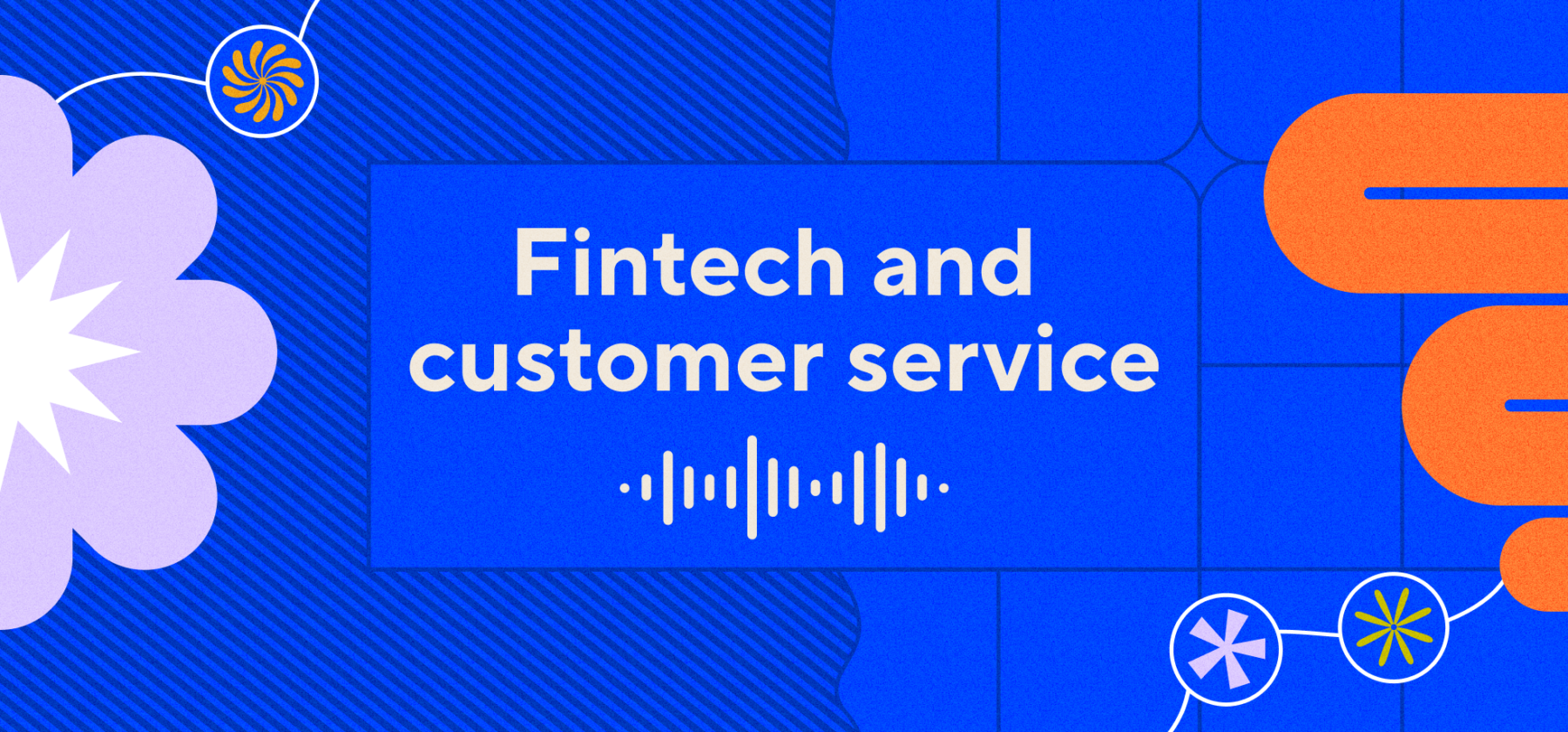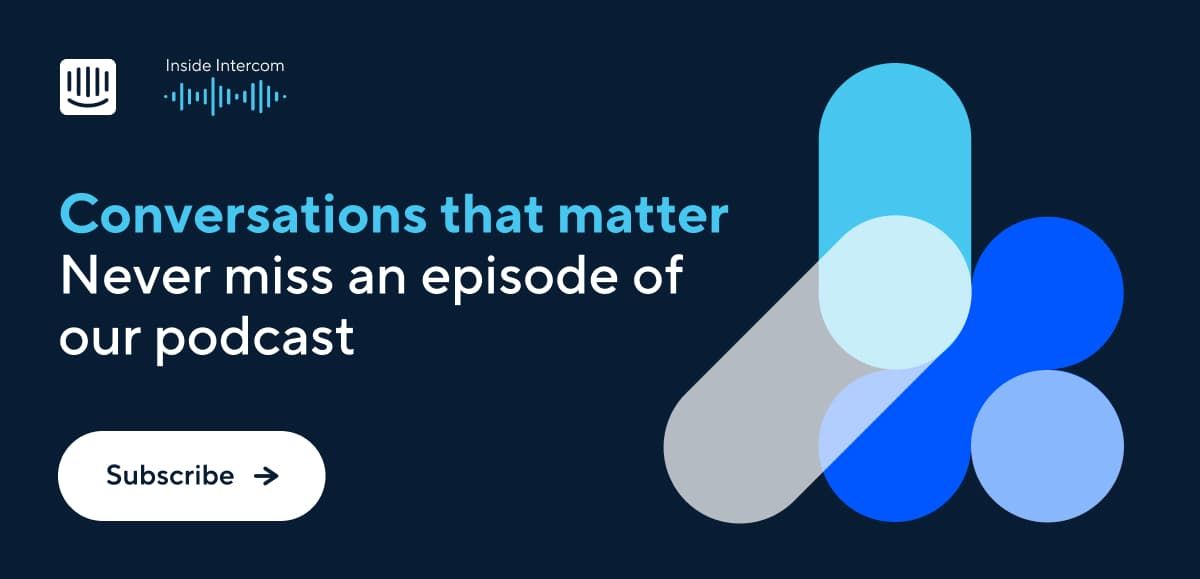
The great differentiator: How fintech companies are prioritizing great customer service
Customers want it all, and they want it now. In the fast-paced world of fintech, could customer service be the thing that sets companies apart from the pack?
Fintech has become a major force in the finance industry. A new wave of startups has introduced new and innovative ways to manage finances that have challenged the traditional banks, developing products and services that offer new opportunities for both consumers and businesses, and providing more convenient ways to manage finances without being bogged down by legacy systems and red tape. And the cherry on top – anyone can easily manage their finances through mobile apps and online platforms without waiting in line in a busy bank branch. Everything is faster and more efficient.
“In today’s competitive landscape, providing excellent customer service has become a critical differentiator for companies seeking to attract and retain customers”
But it doesn’t come without its challenges. Handling someone’s money is, quite obviously, a very sensitive issue. If there’s a problem and the customer is waiting over a day for an email or a few hours for a call, the trust is gone. And trust is everything in fintech. Some may look at it as a necessary evil or even “a pain in the ass,” but in today’s competitive landscape, providing excellent customer service has become a critical differentiator for companies seeking to attract and retain customers. Because while products can end up looking very much alike, exceptional customer service will definitely help you stand out from the crowd.
To get a better sense of the unique challenges and opportunities that fintech companies face, we’ve reached out to a few Intercom customers who’ve been working tirelessly to create customer experiences that take the industry to another level.
In today’s episode, you’ll hear from:
- Bart Bordallo, Co-founder and CEO at Zignaly
- Ben Singer, Customer Support Lead and Payment Operations Lead at Mettle
- Stuart Sykes, Vice President of Service Operations at Zilch
They’ll share their insights on how fintech companies can differentiate themselves from their competitors and build the kind of trust and loyalty that paves the way for success.
Short on time? Here are a few key takeaways:
- Customers are used to a certain immediacy. Fintech companies must be able to provide customers with prompt and efficient answers and services to win their business.
- As with any industry, it’s important to take the time to listen to customers’ feedback and make changes where possible to better address their needs.
- To successfully serve all customers, you can combine traditional finance’s thoroughness and focus on support with the more cost-effective fintech approach of leveraging tech.
- The role of support is not just to fix issues but rather to restore customer loyalty after a moment of friction in your experience.
- To meet customer expectations for fast responses, companies should provide 24/7 support using a mix of automation, self-service, and human agents to address complex issues.
If you enjoy our discussion, check out more episodes of our podcast. You can follow on Apple Podcasts, Spotify, YouTube or grab the RSS feed in your player of choice. What follows is a lightly edited transcript of the episode.
Keeping pace with increasing demands
Liam Geraghty: Hello and welcome to Inside Intercom. I’m Liam Geraghty. In the world of financial technology or fintech, providing top-notch customer service is crucial for building trust and loyalty among customers. Unlike traditional banking, where customers can walk into a physical branch and speak to a representative face to face, fintech companies primarily interact with customers through digital channels. This means that providing excellent customer service is essential for creating a positive customer experience and maintaining a competitive edge in the market. In today’s episode, we’ll explore the unique challenges and opportunities that fintech companies and Intercom customers face in providing exceptional customer service. I’ll be talking with Ben Singer, Customer Support Lead at Mettle, about what customers want in customer service.
Ben Singer: They’re ultimately looking for an omnichannel experience as well. So it’s not enough to be on the phone or a web chat. They’re looking to be able to speak to you in multiple ways and 24/7.
Liam Geraghty: I’ll also be chatting with Zignaly CEO and Co-founder Bart Bordallo.
Bart Bordallo: You are managing money from people, and when somebody touches your money, you are making a deposit, or you are doing something with money, you can get nervous really, really fast.
“The challenge we face quite regularly is that customers want everything here and now. It’s not in an hour; it’s not in a day; it’s here and now”
Liam Geraghty: But first to Zilch, a fintech company that helps customers buy now, pay later. Zilch’s Vice President of Service Operations is Stuart Sykes, and Stuart says they like to think of themselves as “buy now, pay later 2.0”.
Stuart Sykes: Our offering is on the card. You can use your card everywhere that MasterCard is accepted. But if you’re getting close to payday and money’s a bit tight, you can split your payments into four over three weeks. We take 25% at the till, and you split the remaining payments over the next six weeks or three payments.
Liam Geraghty: They call it the Googlization of payments.
Stuart Sykes: It’s kind of our strap line at the moment of customers being able to use our products everywhere, in everyday use, and gain the cash back on every transaction they do and pay in one.
Liam Geraghty: More than a third of Americans check their bank accounts daily. And it’s that kind of frequency that brings particular challenges to the fintech industry, as Stuart explains.
Stuart Sykes: The challenge we face quite regularly is that customers want everything here and now. It’s not in an hour; it’s not in a day; it’s here and now – what I want, how I want it, when I want it. In fintech, we are here to do that for customers. We’re there for ease of use. But you’ve got to service those customers in the right way. Not everything is smooth, especially when dealing with third parties and retailers. So, you’ve got to be able to manage and service them very quickly. Customers do not want to wait around for an answer. They don’t want to wait for their refund. If there is a decline, why? Tell me what’s happening now.
“What service do we give that customer? If it’s top class, the customer will stay with you even if other products are very similar to yours and might look a little more appealing”
Everybody in the fintech world looks at Amazon and says, “They’ve got it.” Now, everyone says, “If you’re not like Amazon or Apple, I don’t want to know.” So, we’ve all got to step up our games and help our customers. Product innovation is something a lot of firms do, the Revoluts of the world, et cetera, and we came in with great products that customers really want and need.
But it’s not just about the products – it’s how you service that customer to make sure your retention stays high and you don’t lose these customers to a rival. Apple brought out its products recently, and Monzo is bringing out products similar to ours. How do we stay ahead of them? What do we do? And for me, the differentiator is certainly service. What service do we give that customer? If it’s top class, the customer will stay with you even if other products are very similar to yours and might look a little more appealing. If the service is great, you’ll keep them.
Liam Geraghty: So how do you keep that service great? Stuart says it’s all about listening.
Stuart Sykes: One of the main things we do is listen to our customers. We use the old-fashioned approach. We speak to our customers, send them reviews, ask them questions about how we can make the product and service better, and we really take them on board. We take it seriously, and we look at what the customers want. A few months ago, many of them said, “Look, I can’t always be on chat because I’ve got work. I’ve got the kids. Have you got a persistent chat? Have you got WhatsApp? Have you got something else that suits my needs? What can you do for me?” So, we look into those areas for our customers and make those changes where we can. Because at the end of the day, we work on the product and use the product, but we’re part of the product. And I think the issue is that we sometimes lose what the customer wants. And when we do that, we’re not servicing them in the right way.
“You’ve got to serve all of your customers from 18 to 80 across a plethora of different platforms and channels they want to use, but be effective and optimal when you do it”
Liam Geraghty: What do you think separates customer service in fintech from other industries?
Stuart Sykes: The major difference I see between fintech and traditional finance and banking is that the traditional funds of banking arms often have larger call centers offshore, onshore, and nearshore because they invest in their customers. They want the customers to be answered in the here and now. With fintech, we want to get the customers’ queries answered as quickly as we can, but we don’t want to spend too much. We don’t want it to cost us too much in overheads.
Now, both approaches, for me, are wrong. You’ve got to find the middle ground. You’ve got to serve all of your customers from 18 to 80 across a plethora of different platforms and channels they want to use, but be effective and optimal when you do it. You can have people taking phone calls, which is an expensive resource, but if you can make sure your IVR is linked to your CRM so you can answer questions through the IVR, “What’s my balance? When’s my payment due?” If you put together all of these simple things and have a hybrid of the fintech and the traditional finance way, you are more optimal and serve your customers better. The channels are there for them, and you will retain more of that customer base. Both ends of that spectrum need to look at this Venn diagram and meet in the middle to ensure their service elements meet modern needs. At the moment, one meets an older need, the other meets a new one, and well, actually, you need to bring those together.
Trust is everything
Bart Bordallo: Zignaly is a social investment platform. We are based on cryptocurrencies. And what we are trying to do is we try to offer the same investment opportunities to everybody. It doesn’t matter your income level or in which part of the world you are.
“When somebody touches your money, you are making a deposit, or you are doing something with money, you can get nervous really, really fast”
Liam Geraghty: That’s the CEO and Co-Founder of Zignaly, Bart Bordallo. And Bart says that trust between a business and a customer has always been important, but in fintech, that trust is even more vital.
Bart Bordallo: You are managing money from people, and when somebody touches your money, you are making a deposit, or you are doing something with money, you can get nervous really, really fast. Generating this trust is very important. In the blockchain and cryptocurrency space, there have been a lot of anonymous projects and teams that have been bad actors, but it’s also true that everything is there. You can go back to the first transaction of Bitcoin and follow all the traffic records until today. People have a misconception about how anonymous the system is. But this is why in Zignaly, we show our faces. We are super open. We are super transparent. Trust is one of the core values in the company, and we think this is something we need to transmit to earn from the users.
Liam Geraghty: What’s been your experience of providing customer service in this space? How important is it for your brand?
Bart Bordallo: At the beginning, I thought it was a pain in the ass. It was something that you need to deal with – you have done something and need to deal with the users. But then, one of our early investors made me see customer service in a totally different way. Are you aware of the book The Effortless Experience?
“When a user is reaching customer service, it’s because something has failed”
Liam Geraghty: Oh yeah. The Effortless Experience: Conquering New Battleground for Customer Loyalty.
Bart Bordallo: This book says that the job of customer service is not to fix issues but to repair the loyalty of the users. When a user is reaching customer service, it’s because something has failed. So, in the beginning, we try to have a robust technical system so it doesn’t fail. At the same time, it has understandable and easy to use because if you don’t know how to use it, you are going to reach support. Then, you need to have self-service, FAQ documentation, videos, et cetera. And in the end, if all of this fails, you have to reach support. The job of support is to fix this loyalty because you have failed the user – you have technical issues or something wasn’t covered in the documentation. So, the user is losing a little bit of the loyalty it has to you, and now support needs to fix it. So, for us, it’s very important. This is how we see customer service.
Can customer service outweigh product?
Ben Singer: I’m Ben Singer, Customer Support Lead here at Mettle.
Liam Geraghty: Mettle is a free digital bank account.
Ben Singer: We are backed by NatWest, and we’re built for small businesses and freelancers in the UK. We’re a relatively straightforward and easy-to-use banking app, and we aim to help customers manage their finances better. We’ve got things like invoices, tools to help customers with tax, and we also integrate nicely with accounting software to help customers get ready for their tax bills at the end of the year.
“Some people may do things sooner, but ultimately, most of the things banks offer are relatively similar. What really differentiates us now is how good your customer service is”
Liam Geraghty: Ben, what are some of the challenges you’re seeing in the fintech space at the minute?
Ben Singer: I would say it’s increased demand from customers. I think customers now are used to seeing good customer experience from whatever industry they’re interacting with digitally: quick responses; the ability to speak to people; the ability to self-serve. And they’re ultimately looking for an omnichannel experience as well. So, it’s not enough to be on the phone or on a web chat. They’re looking to be able to speak to you in multiple ways and 24/7.
Liam Geraghty: How are teams like yours innovating in the space in reaction to that?
Ben Singer: For us, the strategy remains quite consistent – it’s about delivering that omnichannel experience. How can we be where our customers are? Whether that’s communicating with us through their app, via the website, via social media, or they might even want to phone us. It’s also about making sure they can get help 24/7. That doesn’t mean we need, as a support team, need to operate 24/7 or have people there 24/7. We just need to make sure that we’ve got the tools in place to help customers 24/7. And ultimately, we want to continue driving automation and self-service and making sure that our agents are only there to speak to customers when they really need it – when it’s a complex or a really highly emotive subject. That’s where we are really trying to innovate.
Liam Geraghty: Just how important would you say customer service is to your brand?
Ben Singer: It’s absolutely everything. When you look across the industry now, I think the products and services most banks offer are quite similar. Yes, some people may do things sooner, but ultimately, most of the things banks offer are relatively similar. What really differentiates us now is how good your customer service is. So, we want to make sure that we don’t just interact with people through bots or self-service. Yes, that’s there, and it’s fundamental to our strategy, but we also want to make sure someone is there when customers really need to speak to them. At the moment, we’ve got really high public ratings across the App Store, Google Store, and Trustpilot. And that’s fundamental for us.
“You’ve only got yourself to blame if you put product and profit above the customer. If you do that, you will fail”
Liam Geraghty: Back with Stuart Sykes of Zilch. Stuart says, to him, customer service is more important than the product.
Stuart Sykes: It probably sounds a bit strange in the fintech world, but many people have great products, and people look at these products and go, “Oh, that’s fantastic.” But if the service isn’t there, if the customer’s waiting 20 minutes for a phone call, 15 minutes for a chat reply, or a day for an email, the trust is gone. The product could be great, but the customer will find something else.
You’ve only got yourself to blame if you put product and profit above the customer. If you do that, you will fail. You just will. You build that product, you make sure it’s sustainable, and then you make sure that service is absolutely fantastic for your customer base because that breeds confidence and retention. So, your customers are spending more and more with you, which ours do. And you are actually paying less for new leads because there are referrals, word of mouth, and other things that weren’t very fintech. I’ve come from a fintech background, and a lot of it was advertising and marketing, and the word-of-mouth piece was more for the traditional banks. I joined Barclays when I was 14 because my dad said so, and we all grew up with finance. But the world’s changed, and I think service is at the forefront of that change for customers in this generation.
Liam Geraghty: Thanks to Stuart Sykes of Zilch, Bart Bordallo of Zignaly, and Ben Singer of Mettle, all customers of Intercom. That’s it from me for today. Catch you next week.








